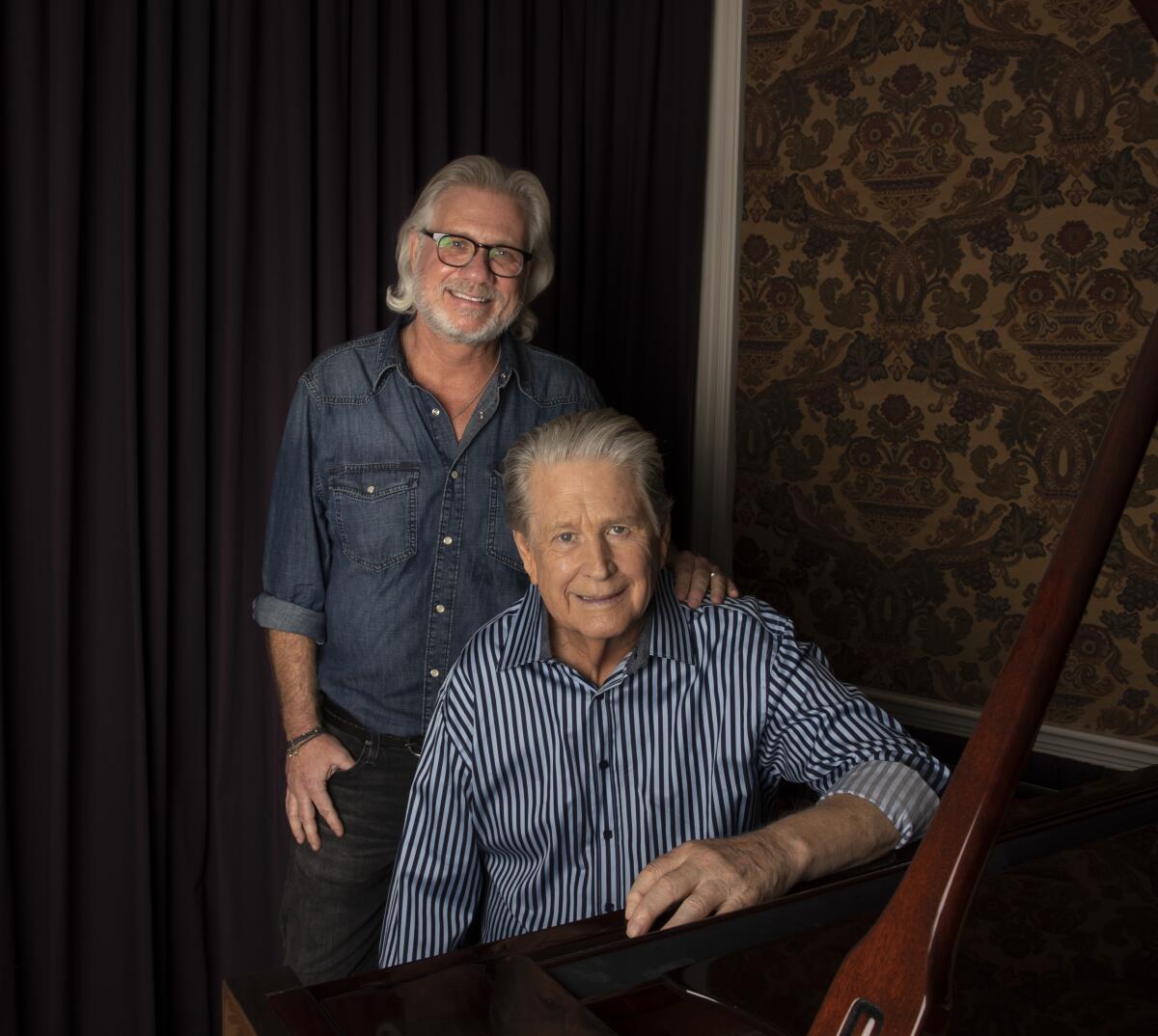Brian Wilson doesn’t say much. Until you listen to his music.

Brian Wilson doesn’t say a whole lot, especially when he’s scared — like during an interview. Sitting at the grand piano in his Beverly Hills home, the supreme Beach Boy resorts to one-word replies: “Right.” “Yes.” “No.”
God only knows what’s playing inside that brilliant head as he stares into your eyes or around the room, with a sweet but melancholy, almost canine expression — much like the 12 dogs making pet sounds around the house. Is it the chaotic voices from his well-known schizoaffective disorder? Or maybe the music of his youth?
Asked if any unexpected benefits came out of the pandemic, Wilson gave a quick and definitive “No.”
Did he spend a lot of time listening to music?
“Yeah.”
Anything new, or was it mostly old stuff?
“Old stuff.”
Your stuff?
“Yeah.”
Getting Wilson, 79, to open up was the massive breaker facing Brent Wilson, no relation to the musician, who directed the documentary “Brian Wilson: Long Promised Road.” The veteran music video and concert director sat the songwriter down in this same music room, turned on his camera and found himself crashing into waves of monosyllables.
“And for 45 minutes, I was like, ‘Oh, my God, my career is over,’” the director recalled. “‘I’ll never get another movie.’
“You were kind, you were sweet,” he added, turning to the songwriter sitting next to him on the piano bench.
“Right,” he answered.
“But ...” the director considered his words, “you’re not going to give the best answers.”
“Right.”
It was the musician’s longtime publicist, Jean Sievers, who suggested getting in touch with Jason Fine, the Rolling Stone reporter who’s interviewed the Beach Boy many times since the late ’90s. The director read Fine’s 2015 article “Brian Wilson’s Better Days,” which had Brian opening up about his mental illness, his family and his music. The key, other than Fine’s comforting demeanor, was to walk, eat and drive around L.A. with his taciturn subject. Brent Wilson realized: This is the movie.
In “Long Promised Road” — named for a song on the Beach Boys’ 1971 album “Surf’s Up” — Fine and Wilson drive from the singer’s beloved Beverly Glen Deli to the Hawthorne site where his childhood house once stood to the beach where the iconic “Surfin’ Safari” cover was shot. At one point in the film, Fine literally holds Brian’s hand.
Inside the car, Wilson calls out songs he wants to hear, and Fine queues them up on his phone. The brilliant music — by Wilson and his brothers — equally gets him talking and does the talking for him.
Interspersed are several generations of talking heads, from Elton John and Bruce Springsteen to Nick Jonas, extolling Wilson’s wizardry and influence. Fine suggested also including Jim James of the Kentucky band My Morning Jacket, who grew up listening to the Beach Boys at his grandmother’s house.
“Their music always made me feel so fun and so free, yet contained within something that haunted me and spoke to the loneliness or sadness I felt even as a child,” James said by email. “Then as I grew into a young adult and onward, their music became even more enhanced and important for me as I discovered ‘Pet Sounds’ and all of the wonderfully strange ’70s records like ‘Surf’s Up.’ It was so comforting to know there was someone else out there who felt that they too just weren’t made for the times they were living in.”
While making the documentary, Brian Wilson — who’s an executive producer on the film — was inspired to write a new piano melody, which he recorded onto a minicassette and gave to the director. But soon after, he underwent surgery for severe back pain that delayed production for several months — followed by yet another back surgery, which has since left him reliant on a walker to get around.
The filmmaker knew it was probably going to be impossible for Brian to finish the song, so he reached out to James to “take a stab at the lyrics.”
“There were several parts on a simple cassette voice memo,” said James — “the main piano verse and chorus and Brian humming along and la la la-ing his beautiful melody. Then the cassette would click off and back on, and he would play another part.”
James reordered the song, “Right Where I Belong,” to start with Wilson’s bridge, “which I thought was so hypnotic and cool,” and drafted lyrics based on Wilson’s own words — many taken from that 2015 interview with Fine. “He’s talking about how, for him, that love is what the music really is,” said James. “That really resonated with me.”
James created an arrangement with a little bit of “Pet Sounds” weirdness and “unexpected turns,” and he sang the chorus and backing vocals himself in Beach Boys-esque falsetto. Once he recovered enough, Brian Wilson sang the rest — lending seasoned, autobiographical authority to lyrics like: “I get anxious, I get scared sometimes / That’s what I live with.”
His voice sounds weathered but somehow still boyish, and the song is ultimately hopeful — demonstrating by its very existence that, despite all of the challenges, Brian Wilson’s still here to sing it.
“I will never forget hearing him singing the track for the first time,” said James. “The way he was belting it out with such energy and conviction brought me to tears.”
Brian Wilson may not have written the lyrics, but was his piano melody about something?
His answer, like all the others, was simple: “About love, yeah.”
More to Read
From the Oscars to the Emmys.
Get the Envelope newsletter for exclusive awards season coverage, behind-the-scenes stories from the Envelope podcast and columnist Glenn Whipp’s must-read analysis.
You may occasionally receive promotional content from the Los Angeles Times.









